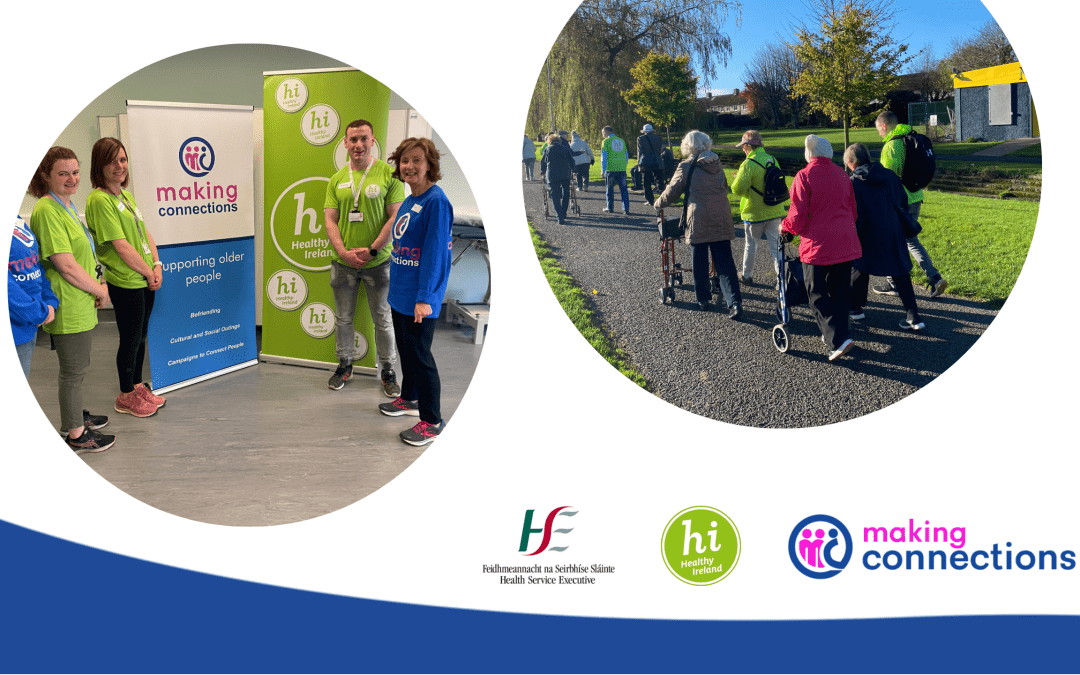Making Connections, in partnership with the HSE Senior Physiotherapist, Dearbhaile Oratis and Claire Nicholl, Senior Occupational Therapist identified a need for a local walking group. They sought support from the HSE Community Healthcare East Health and Wellbeing team and collectively devised and delivered a pilot ‘Walk and Talk’ programme. According to Mary O’Donoghue, Executive Director, Making Connections, they realised there was a need for such a walking group when they saw how many people had
“fallen away from their routines as a result of all the lockdowns. We saw that some people had lost their confidence for walking alone – there was a certain fear. So the idea of meeting for a regular walk was very attractive and very motivating for people.”
Having consulted with HSE Senior Physiotherapist, Dearbhaile Oratis, this collaboration ultimately led to the establishment of the group to empower older adults to stay healthy, and socially connected and to help alleviate loneliness and isolation.
According to Claire Nicholl, Senior Occupational Therapist who worked on the programme:
“For us professionally and personally, it’s been a great group to run – there’s been great enthusiasm about it. They’re walking and then we come back for a cup of tea or coffee. So they are increasing their physical activity, they are socialising. I know a lot of the participants have said it’s the highlight of their week.”
Outlining how she designed the programme, Dearbhaile Oratis, Senior Physiotherapist said she had wanted to “evaluate if we could actually improve muscle strength as well as improving people’s physical activity levels. I carried out two standardised outcome measures which were leg strength, and handgrip strength. Each participant was assessed on week one and the same test was repeated again on week six. I was very pleased that on reassessments, over 90% of the clients had demonstrated an improvement in the muscle strength in their legs and their handgrip.”
There were associated benefits too as Claire explains: “We’re also able to manage issues that arise in a timely manner. For example, one lady advised that her home care package didn’t provide for enough care hours so I was able to link back with the Public Health Nurse and we organised for extra care hours. So it’s been really good in that regard.
Feedback from participants
“It was brilliant being able to come out and meet everyone. I thoroughly enjoyed it and it’s something to look forward to every Wednesday”
Anne Leonard, a participant in the first Walk and Talk Programme in Churchtown, Dublin last year.
For the participants, there has been universal praise and pleasure. According to participant Rhona Sloane: “I am alone for a long time during the day – it’s nice to meet people and they’re lovely. I feel better with talking to someone.”
For William Barton, walking usually means going out alone but the group he notes “ has the added advantage of enabling me to talk to people as I’m going around as well.” Confidence building is a universal theme and for Irene Kelly, it gave her back some of the confidence she had lost: “I did six weeks in the programme – I found it very beneficial. It gave me great confidence.”
Illustrating the success of the programme, Claire notes how “some of the clients from that first group in September still meet up on a Wednesday and go for a walk and come back for a coffee and that’s great to see.”
Expanding the programme
Shane Lee, Health Promotion Officer, HSE Health and Wellbeing outlines how they are now looking at expanding the programme and the experience: “The Walk and Talk programme supports the delivery of Community Health Care East’s Healthy Ireland Implementation Plan, particularly in relation to two key areas of policy – Healthy Eating Active Living and Positive Ageing. We can also see that the programme is very scalable. Two pilot programmes have been delivered in Churchtown to date and the plan to deliver more programmes in the area is underway and we hope to develop the programme across other community healthcare networks.”

